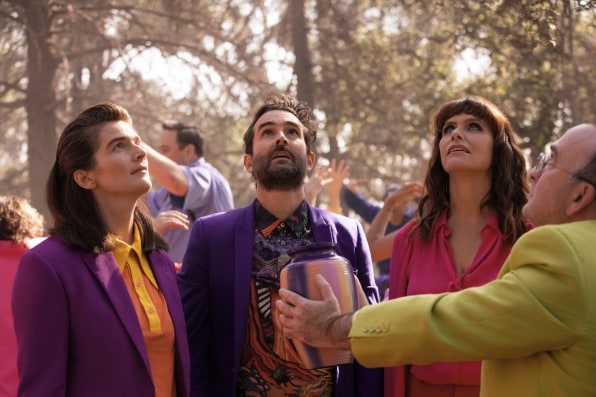The grieving for the end of Transparent, whose series finale debuted Friday on Amazon Prime Video, actually started last year, in real life, when news broke that series star Jeffrey Tambor had been accused of sexual harassment by a cast member and a former assistant. Tambor still vehemently denies those claims, but series creator, Jill Soloway, saw fit to let Tambor go.

As a result—and this should not be a spoiler as it was reported in April—in the Transparent series finale, Maura dies in her sleep off-screen. Her presence is still felt from beyond the grave though. Maura’s death and desire to be cremated, which goes against Jewish faith, sets off a chain of events and meta self-reflection for each of the characters connected to her.
Presenting the Transparent season finale as a musical was a big risk, because fans of any cult-favorite show are extremely sensitive and critical of how that series ends (see Game of Thrones), but in this case, it ironically makes sense. Transparent has always had the elements of the perfect musical: a dysfunctional family still trying to love each other amid chaos and emotional peaks and valleys. It’s too poetic not to set to music. It isn’t the stereotypical toe-tapping, jazz hands-waving fare one might think of when you hear it’s a musical, but it works.
The Pfeffermen clan has been in a state of existential crisis since Maura announced her transition in season one, causing them to grapple constantly with the urge to resist change instead of giving in. In this genre-bending episode, they get their catharsis through song, dance, and awkward Holocaust jokes as they finally step out from Maura’s shadow—especially family matriarch Shelly.
The episode begins with a close-up of Shelly’s feet flexing in leggings—typical musical fare—but eventually, the number forays into a classic American alternative routine about driving along Sepulveda Boulevard? and breaking through the chains of living a monotonous life. Shelly’s biggest moment arrives during one of the most standout numbers entitled, “Your Boundary is My Trigger,” where she swivels in a chair, legs spread eagle, signing about how she knows no boundaries, that she is triggered by her children having boundaries, and that she wishes she could put them right back inside her womb. Basically, she’s saying that she wishes they were never born. That way, she wouldn’t have to deal with the stress they cause her by having the audacity to push her away.
Through this horrific interaction, the Pfeffermen children, Sarah, Josh, and Ally—now nonbinary and going by “Ari”?—begin to self-reflect on their own selfishness and their own lack of boundaries that have hindered their own relationships.
Shelly’s way of grieving is to write a play about her family. It’s a show about the family within a show about the family. She gathers a creative team of people who remind her of her children and the late Maura, as well as her Uber driver, who is also a pianist, to score her production. Ultimately, it all leads up to the episode’s finale, where viewers are led through a song and dance featuring the entire cast of characters singing and prancing around as they sing about the final solution for achieving happiness. The answer is called a “Joyocaust,” and the point is to “take the concentration out of the camps to concentrate on some song and dance.”
It’s weird, awkward, and pro-climactic as the viewer realizes that by the time the series is complete, everyone unexpectedly gets to have their imperfect happy ending.
(20)